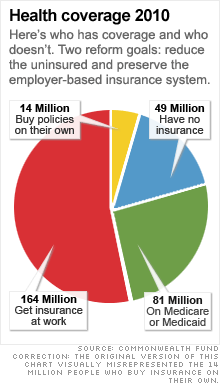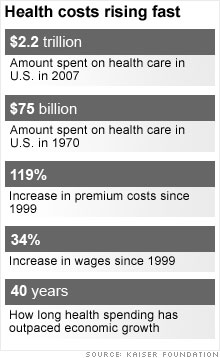Obama plays up small biz health care pain
A new report from the president's economic advisers says small companies are 'severely disadvantaged' by health care costs, but the price of reform may be even higher.


NEW YORK (CNNMoney.com) -- Trying to marshal support for health-care reform, President Obama's Council of Economic Advisers on Saturday released a report outlining the dire effects the current system has on small companies and their workers.
But in mapping out the arguments favoring reform, the report glosses past many details still being debated in Congress that will dramatically affect how costly new health-care laws will be for small businesses.
An estimated one-third of uninsured Americans -- 13 million people -- work for businesses with fewer than 100 employees. Those small companies that do insure their workers pay up to 18% more per worker, on average, than larger firms do for a comparable policy -- when they're able to obtain coverage at all. Among companies with fewer than 10 workers, less than half offer employee health insurance, according to the Council's report.
"Health care is the number-one concern of small businesses," Small Business Administration head Karen Mills said Friday in a conference call with reporters. "Small businesses don't have the access they need to affordable health care right now."
In his Saturday radio address, President Obama said small businesses have dealt with the health care problem by cutting benefits, dropping coverage, shedding jobs or even closing altogether.
"This is unsustainable, it's unacceptable, and it's going to change when I sign health insurance reform into law," the president said.
Through a partnership with social networking site LinkedIn and on WhiteHouse.gov, Obama will solicit feedback this week from the small business community on the health care challenges their companies face.
Council of Economic Advisers Chair Christina Romer is scheduling a Facebook chat on Wednesday to field questions.
"Small businesses are severely disadvantaged by the current U.S. health care system relative to their larger counterparts," her group concluded in its report.
But as Congress crafts its reform proposals, small business owners face the possibility of sharp short-term pain in pursuit of savings that won't materialize for years. That's a problem CEA's report doesn't address.
The most recent Congressional proposal, from the House of Representatives, would require any company with an annual payroll of $400,000 or more to offer health insurance to workers or pay a penalty totaling 8% of payroll costs. Companies with a payroll under $250,000 would be exempt; those in between would pay reduced penalties.
Those penalty payments would help fund a national health insurance exchange through which individuals and small companies could purchase coverage.
Pooling small companies together to increase their collective negotiating power is an approach that sounds attractive, but historically, it hasn't worked. If individuals and small companies can find private insurance elsewhere at better rates, that's what they buy. That leaves behind in the exchange only high-risk, high-cost customers -- exactly the kind of clients insurance companies don't want.
That problem, called "adverse selection," leads to high premiums for exchange participants and often kicks off a death spiral. One of the largest small business purchasing pools, California's PacAdvantage, shut down in 2006 after too many of its insurers pulled out.
Congress hasn't settled on a solution to that problem. Any approach relying on a health insurance exchange would also require the government to act as an insurer and participate as a competitor in the exchange -- the so-called "public option." If private insurers don't step up and offer attractive choices, exchange customers will be able to choose the government plan instead.
"That certainly is what the president has proposed," Romer said Friday. "Making sure that the exchange is stable, that there is ample choice, is something that Congress and the president are both very interested in."
CEA's report concludes that the reforms outlined by both chambers of Congress in their competing proposals will benefit small businesses by lowering their health care costs and increasing coverage options for their workers. If the current system continues unchecked, "small business profits will shrink over time because of rising health-care costs that firms cannot fully pass on to workers," the report says, citing a recent analysis by the Small Business Majority, a pro-reform advocacy group.
That analysis found that rising health-care expenses will cost small companies an estimated $700 million in lost profits this year. By 2018, the annual cost of lost profits will reach $12 billion, according to the Small Business Majority's forecasts
But in the short term, reform will be even more expensive, according to the same analysis. A reform plan similar to the one proposed by the House would reduce small business profits by a whopping $6.5 billion this year. It's not until 2013 that the reformed system's savings would increase, rather than reduce, small business profits.
"The first years of health care reform will require small businesses to invest profits in expanding health coverage for their employees," the Small Business Majority wrote in its analysis.
That's a tough request during a recession, when many small business owners have no profits at all. ![]()
-
The Cheesecake Factory created smaller portions to survive the downturn. Play
-
A breeder of award-winning marijuana seeds is following the money and heading to the U.S. More
-
Most small businesses die within five years, but Amish businesses have a survival rate north of 90%. More
-
The 10 most popular franchise brands over the past decade -- and their failure rates. More
-
These firms are the last left in America making iconic products now in their twilight. More










